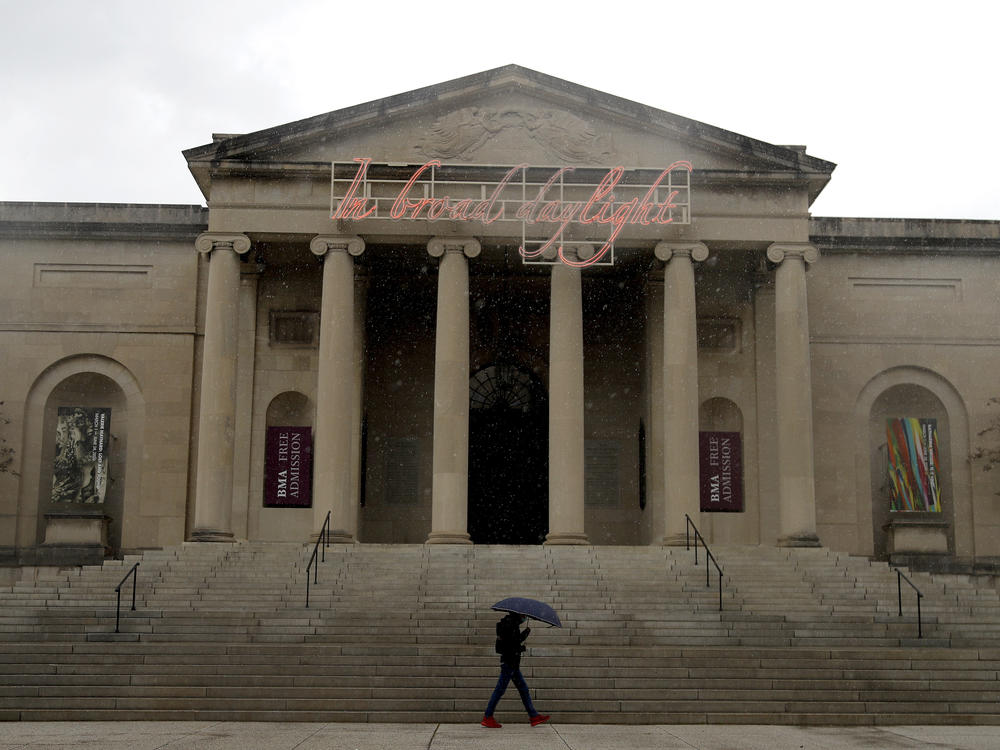Section Branding
Header Content
At This Baltimore Museum, Security Guards Will Be The Ones Curating The Exhibit
Primary Content
They're the ones who are always keeping a close eye on all the art exhibits. But now, a team of museum guards have a chance to become guest curators.
A new exhibit at the Baltimore Museum of Art, which is scheduled to open in March 2022, will be curated entirely by security officers who work in the museum.
The new "Guarding the Art" exhibition will be fully curated by 17 members of the museum's security team and will draw from current works of art in the BMA's collection, with each work selected by one of the participating officers.
As guest curators, the 17 officers will be collaborating with both leadership and staff across the museum to choose and reinterpret works from a variety of eras, genres, cultures and mediums — presenting a particularly human-centered lens through which to consider the objects.
"I feel honored, on one hand, and humble. It's exciting to be able to go beyond my usual role — even though it has its perks, too," guest curator and security guard Dereck Mangus told NPR. "I enjoy engaging with the public, talking about the different artworks. It's very educational and eye-opening to learn more about this whole process."
In addition to curating, the officers will work with the art historian Lowery Stokes Sims, who will provide mentorship and professional development for the officers.
"I am honored to be working with the security staff as the curators of this innovative and groundbreaking exhibition. It sends a potent message to the art world at large about the BMA's commitment to present diverse voices that expand our experience of familiar works of art in the collection," Sims said in a news release.
Each guest curator is being compensated for their time thanks to a grant from the Pearlstone Family Foundation.
The exhibit is an effort to bring inclusivity to the museum
The original idea for the exhibit came from BMA Trustee Amy Elias in a conversation with Asma Naeem, the BMA's chief curator, as museum officials were looking to make the museum more inclusive and representative of the Baltimore community.
"Our security officers spend more time in our galleries and living among our collection than any other staff within the institution," Christopher Bedford, Baltimore Museum of Art director, said in a statement to NPR. "It is their perspectives, their insights, and their relationships with the art and daily interactions with our visitors that will set the stage for Guarding the Art to be an exceptional experience."
While the exhibition is in its early development, the curators have started to consider key artwork selections based on their personal resonances and direct engagement in the galleries — with themes of social justice, resilience, the environment and underrepresented artists being present in the collection.
Some critics say museums need to be doing more
Still, when it comes to representation and social justice in the museum world, some critics say that this move by the BMA is just not enough.
"Finding a bunch of Black and Brown people to give them a show, regardless of whether they work at a museum or not, is fantastic," says Amin Husain, lead organizer of Decolonize This Place — a movement based in New York City that grew out of protests at several New York museums. "Probably long overdue, but doesn't address the structural issues that are on the table."
Those issues — which are industry-wide — include things like poor treatment of workers and gentrification around museums, and for Husain, the solution "isn't getting the labor of people who are already poor or underprivileged and have them participate in something that is consumed by a white gaze."
Museums "have a very specific role in maintaining the status quo and telling one's story," Husain adds. "It's not so much a push back as really a failure of an opportunity by any museum right now, to actually address what has been going on."
The Baltimore Museum of Art issued a statement in regards to the issues of undervalued labor in museums, saying it recognizes "that much more needs to be done to improve diversity, equity, inclusion, and access in the museum field."
To that end, the museum said it has made social equity a key component of its mission statement; added paid fellowships and internships; increased pay for hourly workers and raised pay for underpaid employees. It noted that it is also paying the guards who will curate the new exhibit for their additional time.
"We recognize and agree that there is still a lot of work to be done, and look forward to continuing and expanding our efforts," the museum said.
Copyright 2021 NPR. To see more, visit https://www.npr.org.


